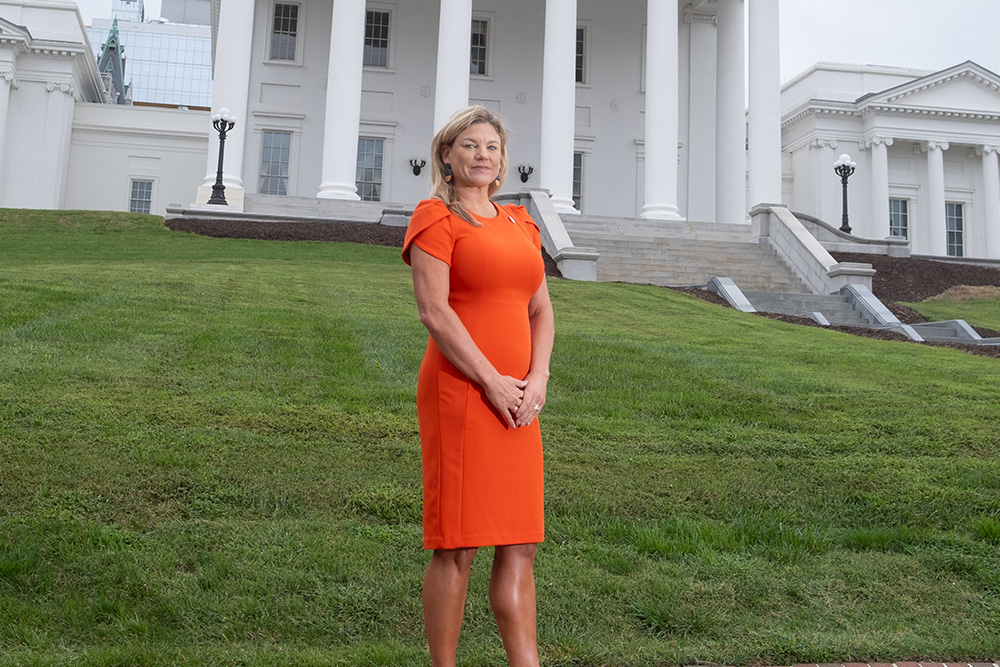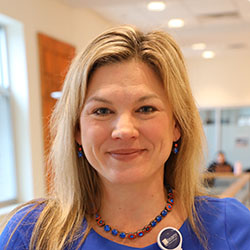Brokering Real World Data Deals for DNP Students

Shelly Smith (BSN ’99, DNP ’12) is no stranger to suits. As a member of the Virginia Health Workforce Executive Development Board, and an appointee of Virginia Gov. Glenn Youngkin, she regularly rubs elbows with politicians and state leaders with a characteristic combination of humor, pluck, and a nurse’s penchant for advocacy.
Smith’s latest deal, though, isn’t policy- or legislation-focused. Instead, she’s brokered access to portions of a voluminous dataset—the state’s All Payers Claims Database—so her graduate students can get experience digging into “huge, messy data” and learn to draw meaning from it. This access will not only build students’ confidence, Smith said, but also inform political and nonprofit healthcare stakeholders’ understanding of the most pressing issues, and where to focus attention and funding. The data will also drive DNP students’ own on-unit quality improvement investigations, part of their requirement to graduate.
“With student projects, it often begins and ends with just that: my project about my thing,” said Smith, interim associate dean for academic programs, director of advanced practice programs, and a professor. “But with this data, they’ll develop intervention ideas by combing through and synthesizing it. What will emerge, even if they’re little clues, little nuggets, is often enough to plant a seed” and really “connect academia and even classroom assignments to real issues, real data, and real life.”
The work also tethers students to real needs, like those of the non-partisan Virginia Health Innovation Network, which earns grant funding from public and private entities to, in turn, fund initiatives to improve healthcare. This fall, Smith teamed up with James Madison University School of Nursing associate professor Holly Buchanan (DNP ’14) to explore immunization data so students at both universities can observe differences by geography, learn to draw conclusions, develop interventions, and then determine whether problems have been solved using data evidence. It’s a deeper dive into unwieldy but rich data than most DNPs usually get—and part of what Smith wants to see change in graduate nursing education.
“Nationally, that’s where most of us fall short,” she explained. “We don’t have access to data, or there’s all kinds of it, but it’s dirty and difficult to use and most nurses don’t know how. A project like this has potential to be symbiotic: We help state officials’ work and understanding, and they help us in ours” by offering an intimate look into what is otherwise hard-to-get information.
There’s a metaphor in Smith and Buchanan’s work, too: that nurses are perfectly positioned to be the connective tissue between real world problems and solutions informed by data that meaningfully improve care.
“We have to have a macrosystem point of view,” Smith said. “If we can teach people to think critically and participate in and understand different things”—research, business, healthcare, finance, big data sets—“we can truly educate people for what the needs are.”
It’s what it means to be a 21st century nursing professor, Smith said.
“To be honest, it’s less about what I think and know and more about what you, my student, thinks when you see what real data show, and then what you do from there,” she said. “Sure, lecturing is sort of fun, but it’s becoming less important because people have information whenever they want it. Having passion is important, but being able to know how to pepper that passion with facts is critical.
“Real data is the secret sauce that gives us that ability.”
###
From the fall 2023 Virginia Nursing Legacy magazine.

